
- Dick Clark suffered a heart attack at a hospital in Santa Monica, his publicist says
- Clark hosted "American Bandstand" from 1956 to 1989
- As host of "American Bandstand," Clark bridged racial and political divides
- He was dubbed "America's oldest living teenager" thanks to his youthful appearance
Los Angeles (CNN) -- He was one of the most recognizable and influential voices in rock n' roll, and he never sang a note.
So in the wake of Dick Clark's death, Americans of all stripes -- including music icons -- shared memories throughout the night and into Thursday.
It wasn't just that Clark first introduced the world to likes of Buddy Holly and James Brown as host of the influential "American Bandstand." It was that his fresh-scrubbed, boyish image and enthusiasm bridged a racial and political divide, making it OK for America's youth to listen to music that often troubled its older generation.
It is what really made him "America's oldest living teenager," a moniker he earned thanks to his youthful appearance.
Voice silenced
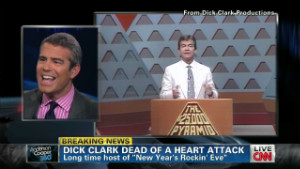 Andy Cohen: Dick Clark was so kind
Andy Cohen: Dick Clark was so kind
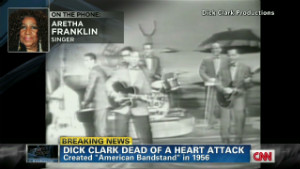 Aretha: Dick Clark party 'too fabulous'
Aretha: Dick Clark party 'too fabulous'
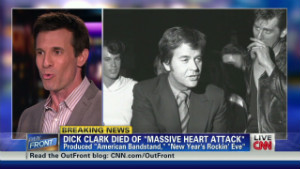 Hammer: 'I got to meet my idol'
Hammer: 'I got to meet my idol'
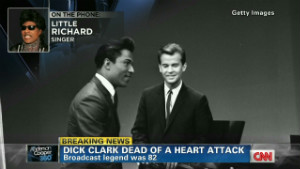 Dick Clark broke race boundaries
Dick Clark broke race boundaries
Clark, 82, suffered a heart attack Wednesday while at St. John's Hospital in Santa Monica for an outpatient procedure, his publicist Paul Shefrin said. "Attempts to resuscitate were unsuccessful."
The family has not yet decided whether there will be a public memorial service for the multifaceted Clark, although Shefrin said, "There will be no funeral."
'America's oldest teen' Dick Clark dies
In December 2004, Clark suffered what was then described as "a mild stroke," just months after announcing he had been diagnosed with Type 2 diabetes.
That stroke forced Clark to cut back on his on-camera work, including giving up the hosting duties for the "Dick Clark's New Year's Rockin' Eve" specials. He appeared briefly as a co-host with Ryan Seacrest on December 31, 2005.
Clark anguished each year over whether to continue appearing on the annual show because of limitations on his speech from the stroke, U.S. Rep. David Dreier, a longtime friend, told CNN Wednesday.
Opinion: The smooth, unstoppable Dick Clark
"But then he would get deluged by people who were stroke victims and other people who had infirmities and they were such admirers of his fighting spirit," said Dreier, R-California.
Broadcast pioneer
Born Richard Wagstaff Clark in Mount Vernon, New York, on November 30, 1929, he began his broadcast career working at a radio station managed by his father.
Clark's "American Bandstand" began as a local TV show in Philadelphia in 1956. The show was picked up by ABC and broadcast nationally a year later.
By 1958, it was the show to watch, with 40 million viewers tuning in to learn about the latest in music.
"If you didn't go on 'American Bandstand,' you hadn't made it yet," singer Aretha Franklin told CNN's "AC360."
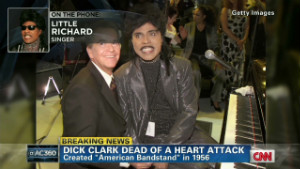 Legendary singers on Dick Clark's legacy
Legendary singers on Dick Clark's legacy
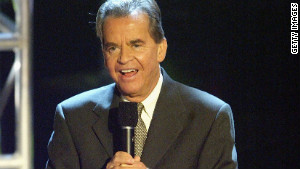 2004: Clark tells King 'I love what I do'
2004: Clark tells King 'I love what I do'
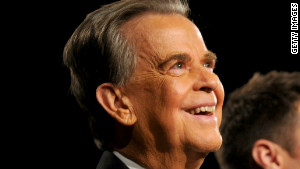 'Bandstand's' Dick Clark dead at 82
'Bandstand's' Dick Clark dead at 82
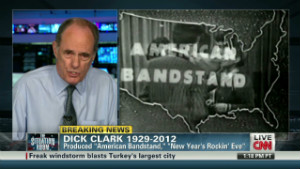 Dick Clark's impact on race and music
Dick Clark's impact on race and music
The savvy entrepreneur was a pioneer in introducing African-American groups and other performers to millions of young TV viewers.
His audiences were among the first integrated on television.
In 1960, the Ku Klux Klan sent death threats to Clark when he brought his short-lived "American Bandstand" spinoff "The Dick Clark Show" to Atlanta. The National Guard was called in to protect the show and its integrated audience -- black and white teens.
"Dick understood the connection that music had. It wasn't about black, it wasn't about white," Shawn Stockman of Boyz II Men told "Piers Morgan Tonight."
While "The Dick Clark Show" lasted only a few seasons, "American Bandstand" continued to be a staple in living rooms across the country.
Clark's image was dealt a blow in 1959 that nearly derailed his career when he got caught up in Congressional hearings into payola, the practice of record companies paying money or making extravagant gifts to radio stations to play their artists' albums.
He admitted to taking gifts, but never money, according to news reports at the time. Clark survived the hearings, but he was forced to end his involvement with a record company.
As rock n' roll came of age, Clark played an influential role in shaping music careers, from Ike and Tina Turner to the Beach Boys to Madonna.
"Only God is responsible for making more stars than Dick Clark," said singer Tony Orlando, who was 16 when he first appeared on Clark's show in 1961.
Clark hosted the show until 1989. It was canceled a few months after he left the show.
Cultural icon
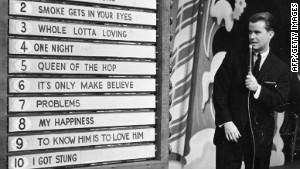 2004: Clark on how he got his start
2004: Clark on how he got his start
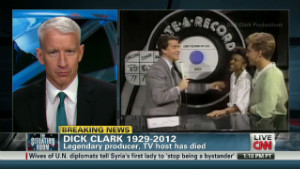 Cooper: Dick Clark's American tradition
Cooper: Dick Clark's American tradition
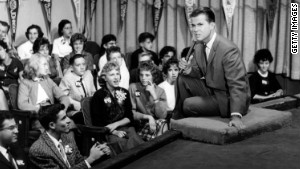 Stars remember Dick Clark
Stars remember Dick Clark
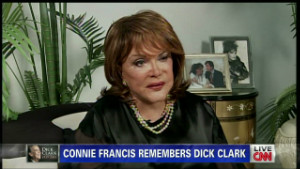 Dick Clark was 'there for every crisis'
Dick Clark was 'there for every crisis'
"American Bandstand" has long been considered the forerunner to musical shows, lending its blended format of musical performances, easy banter and interviews to such staples as "Soul Train" and MTV's "TRL."
It also gave way to the birth of Clark-esque television and radio hosts.
Seacrest, in a statement to CNN, expressed his deep sadness for "the loss of my dear friend Dick Clark."
"He has truly been one of the greatest influences in my life," Seacrest said. "I idolized him from the start, and I was graced early on in my career with his generous advice and counsel. When I joined his show in 2006, it was a dream come true to work with him every New Year's Eve for the last six years."
Friends, admirers mourn Dick Clark
Another major figure on the music scene was too upset to talk about Clark's death. Radio host Casey Kasem's wife, Jean, told CNN that Clark served as substitute host for Kasem's popular "American Top 40."
"We just feel that he was one of the most magnanimous human beings that we ever knew in the industry," she said.
Clark became wealthy as a businessman, producing successful TV shows through Dick Clark Productions. He created the American Music Awards in the 1970s, a competitor to the Grammy Awards.
He sold the company to Washington Redskins owner Daniel Snyder in 2007.
"One of the real draws when we purchased Dick Clark Productions was the opportunity to build on the tremendous foundation of programming that this icon of American broadcasting created," Snyder said.
"I got to know Dick over the past five years, and he was just as personable and warm in person as he was on television. Once you got to know Dick, it was obvious why he was so beloved by his fans. He was, in every sense of the word, a giant."
Clark also hosted numerous other television favorites, including the "Pyramid" game shows and "TV's Bloopers and Practical Jokes."
"This guy was the best," said singer Freddy Cannon, who appeared on "American Bandstand" 110 times. "He helped me from the very bottom of my career all through the '80s and the '90s, and he's going to be missed a lot."
Former CNN talk show host Larry King said Clark's secret for success was his ability to be natural on camera.
"The hardest thing in the business is to be yourself, and no one knew that better than Dick Clark," King said.
The Rock and Roll Hall of Fame inducted Clark in its nonperformer category in 1993.
Singer Donny Osmond said Clark was one of a kind: "If someone cannot fill your shoes, you are a legend. And Dick Clark was a legend."
Clark's passing follows by less than three months the death of another TV dance show icon, Don Cornelius, the creator of "Soul Train." Cornelius was found dead of what authorities said was a self-inflicted gunshot wound in Los Angeles February 1. He was 75.
Clark, who was married three times, is survived by his wife, Kari, two sons and a daughter.
This story was reported by CNN's Alan Duke, Denise Quan and JD Cargill in Los Angeles, and written by Chelsea J. Carter from Atlanta.
